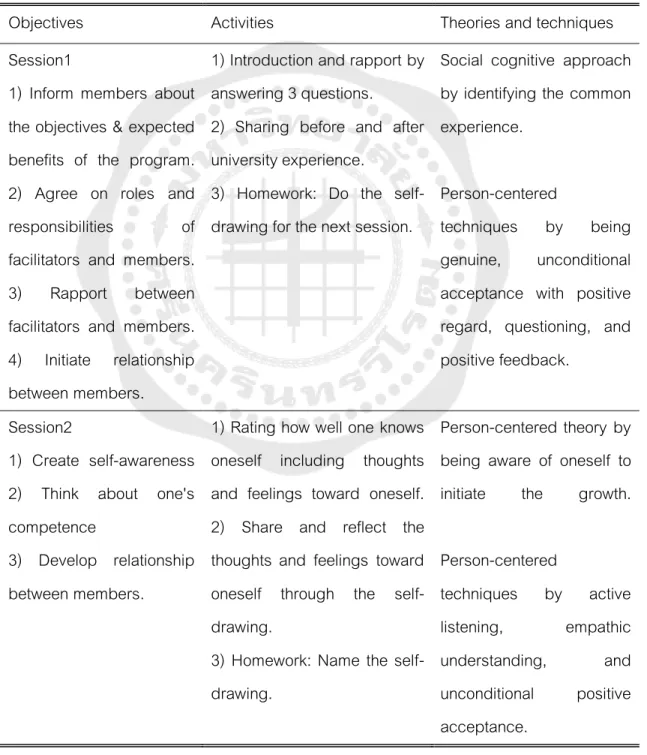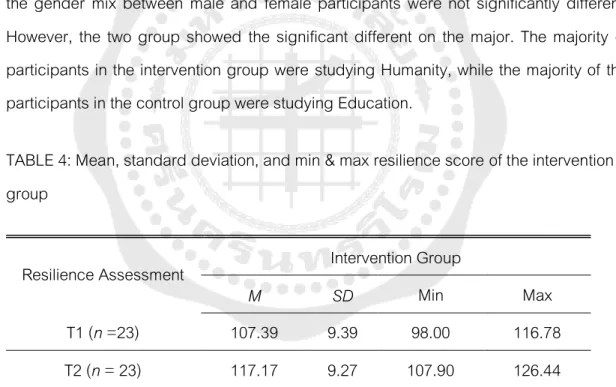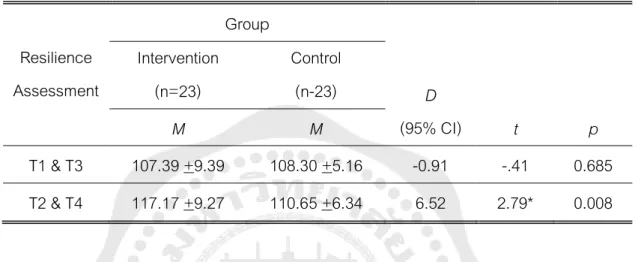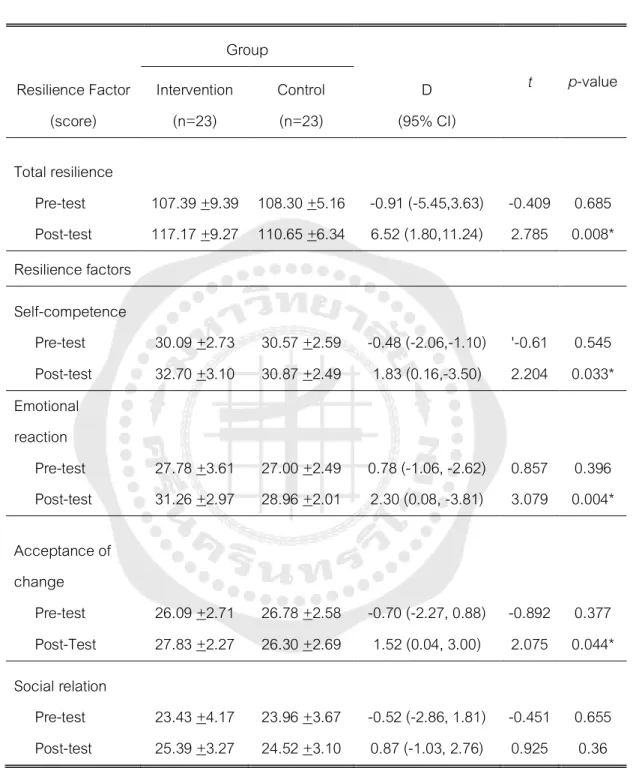Introduction
Literature review
Concept of resilience
- Definitions of resilience
- Theories of resilience
- Resilience and growth mindset concept
- Resilience and adversity of university students
This affects the individual's assessment of the adverse event because under its control the individual therefore develops the positive cognitive response and the positive emotional perception to deal with the adversity. In The International Resilience Project, Grotberg (1995) proposed that the 3 resources consisting of the external resource, the internal resource and the social resource can effectively improve resilience. In summary, the self-efficacy and the social relationship were two of the most cited factors that contribute to the development and improvement of resilience.
Dweck (2017, p. 16) believes that “the view you adopt of yourself profoundly affects the way you lead your life”. Individuals apply mindsets to interpret the meaning of life experience. Additionally, there was a reduction in depressive symptoms associated with peer exclusion compared to adolescents in the control group. The study reported that the adverse experience of peer exclusion had no long-term negative effect on growth mindset freshmen.
The data showed that the growth of emotion mindset is related to psychological adjustment and social adaptability. Social interaction in the university environment and self-efficacy have been found to be a source of resilience and support students in a positive adjustment to the university experience (Leary & DeRosier, 2012).
Group counseling and person-centered theory
- Group counseling
- Person-centered theory
- Resilience group counseling program
Conceptual framework
Research hypothesis
Resilience was referred to the patterns of positive adjustment of ordinary individuals that manifested themselves in the context of adverse life experiences. Therefore, resilience is the psychological capacity of the ordinary individual to recover from adversity in daily life and enable the individual to function well in the life task, which the. Grotberg recognizes the complexity of numerous facilitators in the 3 sources and has recommended stimulating the dynamic interaction between factors.
Resilience has been accepted by psychologists and educators as a suitable solution to support young people in the academic situation. The study used coping style, social support, relational self-construal, and resilience to index the at-risk students in adjusting to the university experience. They deal actively with their problems, translate the insight into actions and apply it in the group and the outside world.
Therefore, the therapist becomes the facilitator in the process, not the agent leading the change (Rogers, 1995). It causes members to cognitively process their experience and see new meaning in old experience, prompting change in self-perception and perception of the world. A brief 3-session group counseling program has been shown to be effective in increasing resilience in third-year female students.
Group counseling has traditionally been accepted and implemented in the university setting to solve problems related to personal adjustment and developmental tasks (Drum & Knott, 2009).
Methodology
The participants in this study were 46 undergraduate students from the Faculty of Education in Early Childhood Education and the Faculty of Humanities in Psychology at Srinakharinwirot University. Studying at the Faculty of Education in Early Childhood Education and the Faculty of Humanity in Psychology at Srinakharinwirot University. The recruitment began with the presentation of the current study to professors from the Faculty of Education, professors from the Faculty of Humanities and the faculty offices.
Professors informed students about the study and the purpose of the study in classrooms, online learning classes, and classroom online groups. A list of interested students was collected and the selection of participants was proceeded based on the inclusion criteria. On the other hand, the resilience scale of Stewart et al. 2007) mainly emphasized the family relationship, relationships with others and social support.
Therefore, the present resilience assessment was the combined strength of resilience assessments on the personal characteristic of self-efficacy and social relationship. To ensure reliability, reliability was analyzed using SPSS software to produce Cronbach's alpha of each factor and Cronbach's alpha of 30 items in the current resilience assessment. The researcher asked participants for permission to use the audio and video recording during the group counseling intervention, and notification of use was made at the beginning of each session.
The program was developed following the extensive review of resilience history, definition of resilience, the protective factor model for resilience development and previous resilience enhancement programs for university students. Then the program was revised according to the recommendations of the authorities and the final group counseling program was ready to be used in the study. The descriptive analysis was used to provide information about participants in the intervention group and the control group.
Statistical analysis was used to process the quantitative data from the pre-intervention assessment and the post-intervention assessment. All data from the pre- and post-intervention assessment were coded and analyzed using SPSS. An independent t-test was used to analyze and compare differences between the intervention and control groups, which were assumed to have equal distributions.
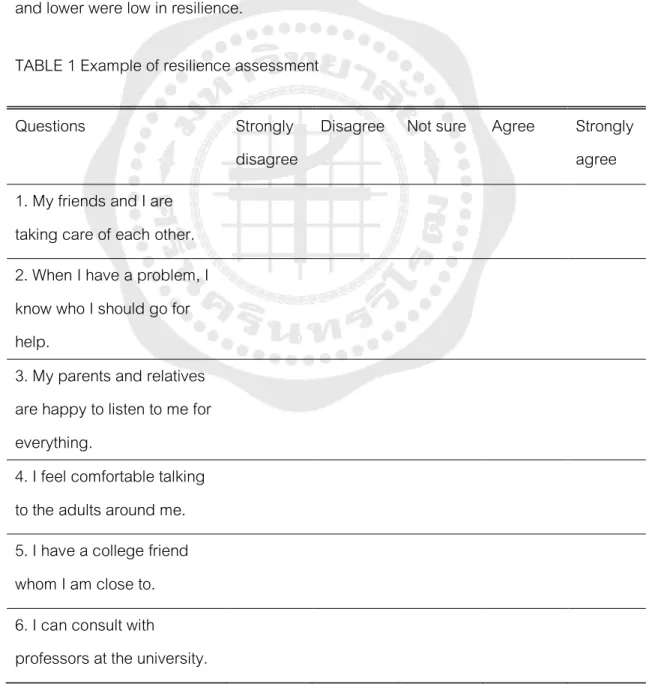
Results
The participants were third-year university students attending the Faculty of Early Childhood Education and the Faculty of Humanities in Psychology. The descriptive data analysis on the participants in the intervention group and the control group was shown in Table 3. For the male participants, the intervention group had 3 male participants or 13.0% and the control group had 6 male participants or 26.1%.
The mean age of the intervention group was 20.70 years and the mean age of the control group was 20.62 years. In the intervention group, 65.2% of participants were Humanities majors and 34.8% were Education majors. The mean age and gender mix between male and female participants were not significantly different.
The majority of participants in the intervention group studied Humanity, while the majority of participants in the control group studied Education. The paired-samples t-test was used to analyze the intervention group's pre-test and post-test resilience scores. Referring to Table 5, the pre-test data showed that the control group's resilience score was slightly higher than that of the intervention group at 0.03, but there was no significant difference.
However, after receiving the intervention, the resilience post-test score of the intervention group increased from 107.39 to 117.17. On the contrary, the post-test persistence score of the control group showed a marginal increase from the pre-test at 108.30 to the post-test at 110.65. When comparing post test scores, the intervention group had a post test score of 3.91 and the control group had a post test score of 3.69.
The results showed that the post-assessment scores of the intervention group on self-efficacy, emotional response, acceptance of change and social relationship increased after receiving the intervention program. The emotional response score also showed the significant increase at .004 (p=.004) or the increase of 3.48 points. Similarly, the acceptance of change score was significantly higher at .044 (p=.044) or the increase of 1.74 points.
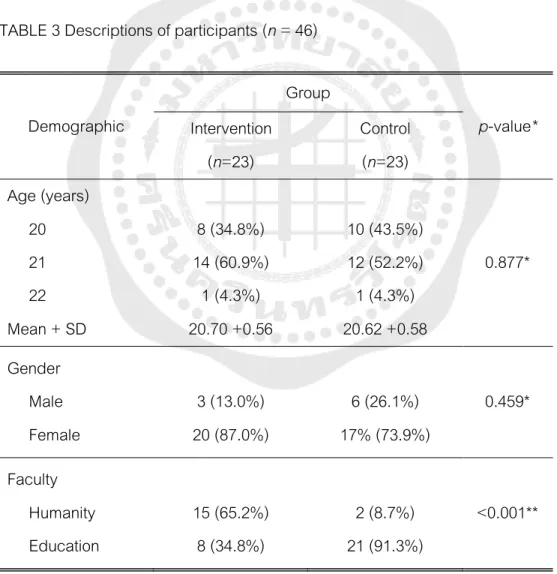
Discussion
After receiving 6-sessions of group counseling, the intervention group had a significant increase in post-resilience test score. In addition, participants had a greater benefit in their level of optimism and more satisfaction with their lives. The intervention group reported a higher resilience score with increased self-efficacy, more effective coping strategies, and more connectedness on the resilience post-assessment.
In the Children's Stress Resilience Project Competence Studies, Garmezy et al. 1984) has concluded that the manifestation of competence is evident of resilience or resistance to stress. Master experience is the most influential approach, and it is included in session 4 and 5 in the counseling program. In agreement with Werner (1996), Rutter (1999) has asserted that cognitive processing style plays an important role in the development of resilience.
In this study, social rapport was cultivated throughout the sessions from members' trust in each other. In addition, a study by Sarmiento et al. 2021) found that during the COVID-19 lockdown, social support was significantly associated with student resilience. On the other hand, group counseling also enables reflection, suggestions and feedback to the participants in the group.
Therefore, both the sense of competence or efficacy and the sense of connectedness created in group counseling simultaneously increase resilience. However, the significant increase in resilience of the intervention group demonstrates that a counseling intervention focused on 2 psychosocial factors, self-efficacy and social relationship, can effectively increase resilience in students in late adolescence. The population and participants consisted of only 3rd-year students of Pedagogy and Humanities.
These participants may not represent the diverse negative experiences of freshmen and sophomores, and students of other majors at the university. This reduced the spontaneity in sharing personal reflection and responses to questions related to photo compositions. Program on Depression and Resilience of Nursing Students in a College of Nursing in the Northeast Region of Thailand.
Protective role of resilience to COVID-19 impact on the quality of life of nursing students in the Philippines. 71 Stress among Khon Kaen University medical students during online learning in the era of the COVID-19 pandemic.
